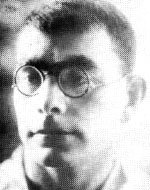Keitelger, Chaim
Son of Sima and Eliyahu. He was born in 1904 in Poltava, Russia. His childhood was spent in the bosom of a family of workers who were observant of Jewish tradition. He was a quiet, obedient boy. When he was eighteen, with the Balfour Declaration, the boy was caught up in the Zionist idea and the aspiration to immigrate to Eretz Israel and to participate in its construction. Despite his parents’ opposition, he joined the Brenner Labor Battalion and went to agricultural training. In 1922, he and other members of the battalion were sent to the city of Jerzewo to rebuild the ruins of the local government following the war. Here the young people prepared themselves for aliyah and studied in secret Hebrew and Zionist chapters. Because of his separation from his family, which opposed his chosen path, life in this period was self-contained and he did not speak to his friends about his troubles. In 1923 he immigrated to Eretz Israel. After his immigration, he received a letter from his parents that they had accepted their son being a pioneer in the country, and the renewed connection strengthened his spirit. In Israel he first worked as a shepherd in Kfar Giladi and from there moved to Kibbutz Tel Yosef in 1928. In Tel Yosef, he worked in agriculture, mainly in the field of hay and animal feed, after a few years, according to the decision of his friends, to a truck driver. The kibbutz was known for its good relations with friends, its modesty, and its special friendly attitude toward the local children. When World War II broke out, he was one of the first volunteers from the Yishuv to the British army. He enlisted in July 1940 and was assigned to Transport Unit 462, where he stood out as an exemplary soldier, responsible and disciplined. On the 27th of Nisan 5703 (1.5.1943), the ship “Aryanfora” was attacked near Malta by members of the transport unit, by German bombers and sunk. One hundred and forty of the soldiers of the unit went down to the depths of the sea, Chaim among them. Kibbutz Tel Yosef published in his memory a booklet containing the words of friends about his character and his work. In the military cemetery on Mount Herzl in Jerusalem, a ship-shaped monument was erected in memory of those who were missing, and next to it is a water pool with the names of the fallen engraved on the bottom.
